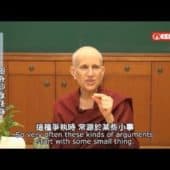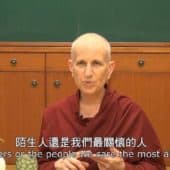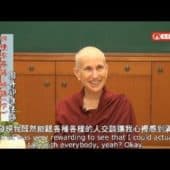The Four Nonvirtues of Speech (Taiwan 2018)
Short talks recorded at Luminary Temple in Taiwan on how to use our speech to create virtue by avoiding lying, harsh speech, divisive speech, and idle talk.

The first nonvirtue of speech: Lying (part 1)
The Buddha pointed out four types of speech that we should avoid, the first of which is lying.
View Post
The first nonvirtue of speech: Lying (part 2)
We have to observe the situations in which we tell lies. If we have done things we hope others will not discover, instead of lying,…
View Post
The second nonvirtue of speech: Divisive speech...
Divisive speech often arises when others do what we don’t like, and we seek out friends to vent our anger. However, this only harms ourselves…
View Post
The second nonvirtue of speech: Divisive speech...
Divisive speech often arises in the workplace, when a group of people gets together to criticize an individual who we think is harming the group.
View Post
The third nonvirtue of speech: Harsh speech (pa...
Harsh speech includes criticizing, denigrating, and humiliating others. Or we may scold others to “guide” them, and eventually they respond to us with anger.
View Post
The third nonvirtue of speech: Harsh speech (pa...
When adults scare children by saying there are ghosts, this is a form of harsh speech. We actually want to care for others, but we…
View Post
The third nonvirtue of speech: Harsh speech (pa...
Harsh speech sometimes happens in close relationships. In a marital argument, both parties feel hurt and think their spouse has not understood them.
View Post
The fourth nonvirtue of speech: Idle talk (part 1)
The motivation for idle talk is basically to pass time and amuse ourselves. If our motivation is to build good relationships with others, that is…
View Post
The fourth nonvirtue of speech: Idle talk (part 2)
Venerable Thubten Chodron shares a positive memory of something she did in a large gathering that avoided idle talk.
View Post